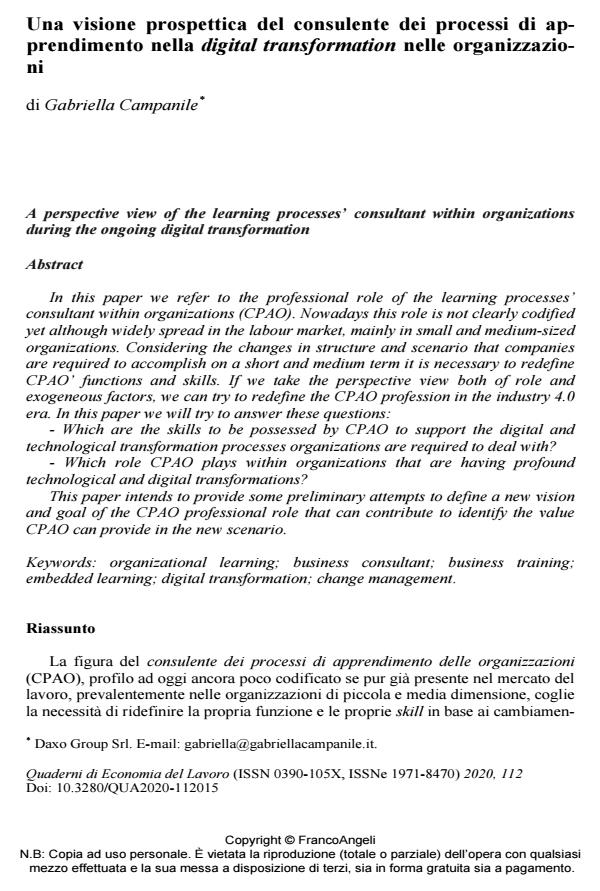A perspective view of the learning processes’ consultant within organizations during the ongoing digital transformation
Journal title QUADERNI DI ECONOMIA DEL LAVORO
Author/s Gabriella Campanile
Publishing Year 2021 Issue 2020/112 Language Italian
Pages 17 P. 229-245 File size 215 KB
DOI 10.3280/QUA2020-112015
DOI is like a bar code for intellectual property: to have more infomation
click here
Below, you can see the article first page
If you want to buy this article in PDF format, you can do it, following the instructions to buy download credits

FrancoAngeli is member of Publishers International Linking Association, Inc (PILA), a not-for-profit association which run the CrossRef service enabling links to and from online scholarly content.
In this paper we refer to the professional role of the learning processes’ consultant within organizations (CPAO). Nowadays this role is not clearly codified yet although widely spread in the labour market, mainly in small and medium-sized organizations. Considering the changes in structure and scenario that companies are required to accomplish on a short and medium term it is necessary to redefine CPAO’ functions and skills. If we take the perspective view both of role and exogeneous factors, we can try to redefine the CPAO profession in the industry 4.0 era. In this paper we will try to answer these questions: - Which are the skills to be possessed by CPAO to support the digital and technological transformation processes organizations are required to deal with? - Which role CPAO plays within organizations that are having profound technological and digital transformations? This paper intends to provide some preliminary attempts to define a new vision and goal of the CPAO professional role that can contribute to identify the value CPAO can provide in the new scenario.
Keywords: Organizational learning; business consultant; business training; embedded learning; digital transformation; change management.
- Amicucci F. e Gabrielli G., a cura di (2013). Boundaryless learning. Nuove strategie e stru-menti di formazione. Milano: FrancoAngeli.
- Commissione Europea (2020). Indice di digitalizzazione dell’economia e della società (DESI) 2020 Italia, -- «testo disponibile al sito: https://ec.europa.eu/digital-single-market/en/scoreboard/italy» (28.12.2020).
- Federighi P. (2009). L’educazione incorporata nel lavoro. Studi sulla Formazione, 12(1/2): 133-151.
- Federighi P., a cura di (2018). Educazione degli Adulti. Ricerche, politiche, luoghi e profes-sioni. Firenze: Firenze University Press.
- Federighi P., Campanile G. e Grassi C. (2012). Il Modello dell’Embedded Learning nelle PMI. Pisa: Edizioni ETS.
- Legge 22 maggio 2017, n. 81. Misure per la tutela del lavoro autonomo non imprenditoriale e misure volte a favorire l’articolazione flessibile nei tempi e nei luoghi del lavoro subor-dinato.
- Ministero del Lavoro e delle Politiche Sociali. Smart working, -- «testo disponibile al sito: https://www.lavoro.gov.it/strumenti-e-servizi/smart-working/Pagine/default.aspx» (28.12.2020).
- Osservatorio Politecnico di Milano (2020). Osservatorio Smart working 2020. Smart wor-king: Il futuro del lavoro oltre l’emergenza, -- «testo disponibile al sito: https://www.som.polimi.it/event/smart-working-il-futuro-del-lavoro-oltre-lemergenza/» (28.12.2020).
- Samuel A. (2016). The Soft skill of Great Digital Organizations. Harvard Business Review, -- «testo disponibile al sito: https://hbr.org/2016/02/the-soft-skills-of-great-digital-organizations» (28.12.2020).
- Schuh G., Anderl R., Gausemeier J., ten Hompel M. and Wahlster W., editors (2017). Indus-trie 4.0 Maturity Index. Managing the Digital Transformation of Companies (Acatech Study). Munich: Herbert Utz Verlag, -- «testo disponibile al sito: http://industria40.regione.toscana.it/documents/685883/702347/Industry+4.0.+Maturity+Index_ENG/948e474e-47d2-4903-918b-613e00ce3912» (28.12.2020).
- Senge P.M., a cura di (2019). La quinta disciplina. L’arte e la pratica dell’apprendimento organizzativo. Napoli: Editoriale Scientifica
Gabriella Campanile, Una visione prospettica del consulente dei processi di apprendimento nella digital transformation nelle organizzazioni in "QUADERNI DI ECONOMIA DEL LAVORO" 112/2020, pp 229-245, DOI: 10.3280/QUA2020-112015